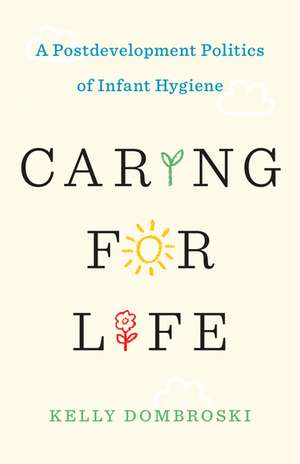Caring for Life: A Postdevelopment Politics of Infant Hygiene: Diverse Economies and Livable Worlds
Autor Kelly Dombroskien Limba Engleză Paperback – 12 mar 2024
In order to mitigate the worst forecasts of climate change, many of us need to make drastic adjustments to how we live and what we consume. For Kelly Dombroski, these changes must also happen in the home: in rethinking routines of care and hygiene that still rely on disposable and plastic products. Caring for Life examines the remarkable evolution in Asia-Pacific hygiene practices and amplifies the creative work of ordinary people guarding human and more-than-human life in their everyday practices of care.
Dombroski develops the concept of “guarding life,” a viewpoint that counters homogenous cultural practices and imposed sanitation standards and instead embraces diverse hygiene practices that are networked across varying wisdoms and bodies. She traces how the Chinese diaper-free infant toilet training practice of baniao has traveled to Australia and New Zealand, and she explores the practice of elimination communication, in which babies learn to communicate to their caregivers when they need to eliminate, thus removing the need for diapers. A mother herself, Dombroski conducted ethnographic research while mothering to examine how collectives of mothers draw on Chinese knowledge and their own embodied practices of childcare to create new hybrid forms of infant care.
Caring for Life is a call to action, a theory of change, and a fascinating account of the transformational possibilities of care practices. It shows how experiments in personal care can lead to collective, widespread change, ultimately providing a practical and hopeful vision for environmental action.
Retail e-book files for this title are screen-reader friendly with images accompanied by short alt text and/or extended descriptions.
Preț: 220.83 lei
Nou
Puncte Express: 331
Preț estimativ în valută:
42.26€ • 45.89$ • 35.50£
42.26€ • 45.89$ • 35.50£
Carte nepublicată încă
Doresc să fiu notificat când acest titlu va fi disponibil:
Se trimite...
Preluare comenzi: 021 569.72.76
Specificații
ISBN-13: 9781517901608
ISBN-10: 151790160X
Pagini: 224
Ilustrații: 9 black and white illustrations
Dimensiuni: 140 x 216 x 15 mm
Greutate: 0.29 kg
Editura: University of Minnesota Press
Colecția Univ Of Minnesota Press
Seria Diverse Economies and Livable Worlds
ISBN-10: 151790160X
Pagini: 224
Ilustrații: 9 black and white illustrations
Dimensiuni: 140 x 216 x 15 mm
Greutate: 0.29 kg
Editura: University of Minnesota Press
Colecția Univ Of Minnesota Press
Seria Diverse Economies and Livable Worlds
Notă biografică
Kelly Dombroski is associate professor in geography at Te Kunenga ki Pūrehuroa Massey University, Aotearoa New Zealand.
Cuprins
Contents
Introduction
1. Thinking Multiplicity
Interlude: In the Courtyard of Venerable Grannies
2. Holding Out
Interlude: The Body Multiple
3. Shifting Assemblages
Interlude: Situated Hygienes
4. Traveling Practices
Interlude: Experiments
5. Reassembling Hygienes
6. Guarding Life
Acknowledgments
Notes
Bibliography
Index
Introduction
1. Thinking Multiplicity
Interlude: In the Courtyard of Venerable Grannies
2. Holding Out
Interlude: The Body Multiple
3. Shifting Assemblages
Interlude: Situated Hygienes
4. Traveling Practices
Interlude: Experiments
5. Reassembling Hygienes
6. Guarding Life
Acknowledgments
Notes
Bibliography
Index
Recenzii
"Caring for people and planet should go hand-in-hand but mostly do not. Embracing global multiplicity and diversity in hygiene, health, and care assemblages, Kelly Dombroski offers hopeful and creative paths to socioecological change by guarding human and more-than-human life. This is a transformative book for our troubled times and essential for research on contemporary care practices."—María Puig de la Bellacasa, author of Matters of Care: Speculative Ethics in More Than Human Worlds
"Kelly Dombroski has written a brilliant book on hygiene as the ‘guarding of life.’ With great honesty, she sets out the possibilities for environmental and social change in a thought-provoking treatise on how to shift from resource-intensive and waste-producing practices to the flourishing of human and nonhuman life, beginning with an appreciation for infant hygiene practices in out-of-the-way places. A must-read for all of us striving to multiply possibilities for planetary transformation and communal wellbeing."—Wendy Harcourt, International Institute of Social Studies, Erasmus University Rotterdam
"A wonderful example of possibilities for environmental and social transformation. This book is a model and tool for other researchers who are passionate about using feminist and decolonial practices in ethnographic fieldwork."—Canadian Geographies
"This volume emerges as a groundbreaking and fundamental overview of the current state of DH in the Global South. It illuminates the distinctive challenges prevalent in these regions [...] and links them with a comprehensive body of critical literature."—H-Net Reviews
"Kelly Dombroski has written a brilliant book on hygiene as the ‘guarding of life.’ With great honesty, she sets out the possibilities for environmental and social change in a thought-provoking treatise on how to shift from resource-intensive and waste-producing practices to the flourishing of human and nonhuman life, beginning with an appreciation for infant hygiene practices in out-of-the-way places. A must-read for all of us striving to multiply possibilities for planetary transformation and communal wellbeing."—Wendy Harcourt, International Institute of Social Studies, Erasmus University Rotterdam
"A wonderful example of possibilities for environmental and social transformation. This book is a model and tool for other researchers who are passionate about using feminist and decolonial practices in ethnographic fieldwork."—Canadian Geographies
"This volume emerges as a groundbreaking and fundamental overview of the current state of DH in the Global South. It illuminates the distinctive challenges prevalent in these regions [...] and links them with a comprehensive body of critical literature."—H-Net Reviews








